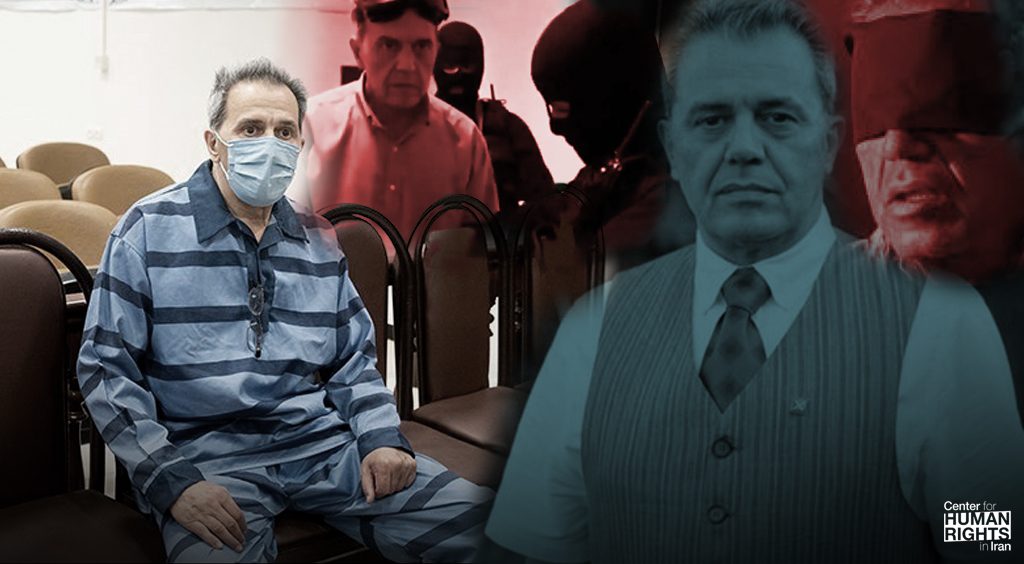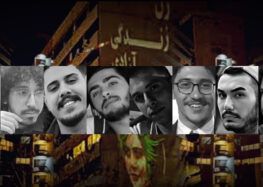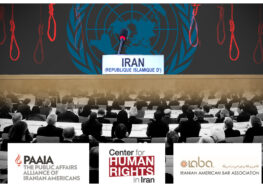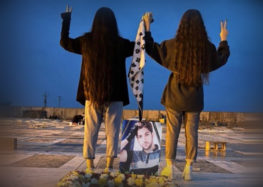Another Foreign Citizen Nabbed by Iran Now Faces Possible Execution
 Political Dissident Jamshid Sharmahd Is Unable to Defend Himself in Iranian Judicial System
Political Dissident Jamshid Sharmahd Is Unable to Defend Himself in Iranian Judicial System
World Must Speak Out against Iran’s Abductions and Attacks on Dissidents Abroad
February 8, 2022 – An Iranian-born German citizen, U.S. resident and political dissident, Jamshid Sharmahd, who was abducted by Iranian agents in Dubai and forced to return to Iran in 2020, is at risk of being executed there while being denied the right to defend himself in court.
Sharmahd, 66, is one of several Iranian dissidents that have been illegally abducted by Iranian agents and brought back to Iran in recent years. The case closely echoes that of the France-based dissident Ruhollah Zam, who was abducted by Iranian agents and executed in December 2020 after a sham trial.
“The Iranian authorities not only go after dissidents inside the country, but they are also repeatedly targeting Iranian dissidents abroad, abducting them to Iran and trying them in sham trials to silence them and intimidate others into silence,” said the Executive Director of the Center for Human Rights in Iran (CHRI) Hadi Ghaemi.
“The international community needs to forcefully speak out against this criminal activity, which puts dissidents everywhere at risk, and let the Iranian authorities know there will be political and economic consequences as long as they continue these actions,” added Ghaemi.
The Center for Human Rights in Iran urges the UN High Commissioner for Human Rights, all relevant UN special rapporteurs, the Human Rights Council, and all Member States to demand the release of the illegally abducted Sharmahd, the immediate cessation of these extraterritorial abductions, and an end to the criminalization of dissent in Iran.
The due process violations in this case are severe:
- Sharmahd, who is accused of planning a terrorist act in Iran, has been charged with the catch-all, death-penalty-carrying charge of “corruption on earth.”
- He has not been allowed to retain a lawyer of his choice and instead told to pay hundreds of thousands of dollars for a court-appointed lawyer, his daughter Gazelle Sharmahd told CHRI.
- Sharmahd was forced to “confess” under torture, which was then aired on state TV, a routine pattern in Iran to discredit defendants and legitimize their prosecution.
- He has been held virtually incommunicado, denied contact with family.
- The judge handling Sharmahd’s case is the notorious Abolqasem Salavati, who is routinely handpicked by the judiciary to handle dissidents’ cases and is the judge who sentenced to death the dissident Ruhollah Zam.
Initially, the same lawyer who represented Zam was appointed to Sharmahd’s case. CHRI could not verify whether that lawyer, Dabir Daryabeigi, remains on Sharmahd’s case.
Family Decries “Sham Trial” While Germany and U.S. are Silent
“He has had no contact with us since September (six month ago), we don’t know where he is, he has no access to his lawyer, his lawyer has no access to his file, the regime lawyer that is blackmailing us may still be on his case,” said Gazelle Sharmahd in a statement to CHRI on February 6, 2022.
“This is a sham trial, this is illegal even for Iranian rights, it is in violation of their own laws, it is unethical and inhumane!” she added.
Sharmahd’s family was not informed of the trial date and only learned about it through social media. Gazelle Sharmahd added in her statement to CHRI that even the German consulate had no information about the trial.
According to his daughter, Sharmahd was the spokesperson of the U.S.-based Iranian opposition group the Kingdom Assembly of Iran. Iran has accused Sharmahd of being the leader of Tondar, the group’s militant wing, which Iran holds responsible for planning a terrorist attack at an Iranian mosque in 2008 that killed 14 people and wounded over 200.
Gazelle Sharmahd told CHRI that her father was kidnapped by Iranian security agents while on a layover in Dubai in July 2020 and brought to Iran. He was then forced to make “confessions” under physical and psychological torture while being held in solitary confinement.
There are also concerns that he is not receiving proper medical care; Sharmahd suffers from Parkinson’s disease along with other health conditions that require medication.
Iranian authorities have refused to reveal Sharmahd’s exact location and health status to his family, and have denied him German consular access.
The governments of Germany, where Sharmahd is a citizen, and the U.S., where Sharmahd was living before his abduction, have not spoken publicly about his case since his trial began. Both governments are currently engaged in talks over Iran’s nuclear program.
“The Iranian government’s now routine practice of nabbing citizens of other countries to use as political playing cards—and to silence dissent—must be addressed or it will continue. Germany and the U.S. should not be silent as this man faces the gallows in Iran without the right to defend himself,” said Ghaemi.
Multiple Rights Violations
Iranian state TV’s airing of coerced confessions and dramatizations involving Sharmahd constitutes multiple violations of Iranian law.
In August 2020, days after Sharmahd’s abduction from the UAE, the state-run Islamic Republic of Iran Broadcasting (IRIB) broadcast a video showing him in detention, sometimes blindfolded, and describing—in broken statements—incriminating activities including the 2008 bombing.
IRIB has a documented history of broadcasting forced confessions. Typically well-staged productions, they are used to defame dissidents, intellectuals, and other individuals whom the authorities wish to discredit, legitimize their prosecution, and amass public support for their sentences.
The video has been used as “evidence” against Sharmahd, a violation of Article 38 of Iran’s Constitution, which states that “All forms of torture for the purpose of extracting confession or acquiring information are forbidden. Compulsion of individuals to testify, confess, or take an oath is not permissible; and any testimony, confession, or oath obtained under duress is devoid of value and credence.”
Article 169 of the Islamic Penal Code also nullifies forced confessions: “A confession which is taken under coercion, force, torture, or mental or physical abuses, shall not be given any validity and weight….” and Article 1262 of the Civil Code states, “The person making a confession must be mature, sane, capable of forming an intention, and free…”
The airing, in 2020 of a state TV series, titled “Safe House,” which dramatized the activities of the Iranian security forces including Sharmahd’s abduction, is meanwhile a violation of Article 96 of Iran’s Code of Criminal Procedure, which notes that “During preliminary investigations, the publication of images or other details by the media or judicial and law enforcement authorities regarding the suspect’s identity is prohibited.”
Sharmahd, as in other “national security” cases against dissidents, was denied his choice of legal counsel based on Article 48 of the Code of Criminal Procedure, which strips prisoners of the right to select their own lawyer, leaving them with the sole option of choosing from a list of lawyers approved by the state’s judiciary chief.
“By employing the media, Iran’s security establishment is trying to influence public opinion and legitimize the criminal abduction of dissidents and create fear among political exiles,” Ghaemi said.
In July 2021, Iranian security agents attempted to kidnap Iranian-American dissident journalist and activist Masih Alinejad from American soil as part of a wider scheme of targeting Iranian dissidents, including those living in Canada and the United Kingdom, according to a U.S. indictment.
Dissident activist Ruhollah Zam was not so lucky. He was kidnapped by Iranian state agents during a trip to Iraq from his home in France and forcibly returned to Iran, subjected to torture and other ill-treatment and executed in December 2020.
Meanwhile, Swedish-Iranian national Habib Chaab, aka Osayvad, who was abducted in Turkey and brought to Iran against his will in September 2020, has been on trial in the Revolutionary Court in Tehran since January 18, 2022, on national security charges in connection with his activities in an Arab separatist organization in southwest Iran.
Also, Foroud Fouladvand, founder of a monarchist organization known as the Kingdom Assembly of Iran, has been missing in Turkey with two Iranian dual-nationals since January 2007. CHRI fears they were also abducted by Iranian security agents.
Read this article in Persian






